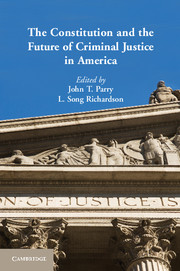Book contents
- Frontmatter
- Contents
- Contributors
- Acknowledgments
- Introduction
- Part I Foundations – The Scope of Criminal Law and Access to Counsel
- Part II Race and Criminal Procedure
- Part III Policing and Privacy
- Part IV Technology and the Surveillance Society
- Part V Confessions and miranda
- Part VI Conviction, Sentencing, and Incarceration
- 12 Collateral Consequences of Criminal Conviction
- 13 Psychopathy, Criminal Responsibility, Punishment, and the Eighth Amendment
- Part VII Emergencies and Borders – Immigration, Terrorism, National Security, and Transnational Crime
- Index
- References
12 - Collateral Consequences of Criminal Conviction
Published online by Cambridge University Press: 05 June 2014
- Frontmatter
- Contents
- Contributors
- Acknowledgments
- Introduction
- Part I Foundations – The Scope of Criminal Law and Access to Counsel
- Part II Race and Criminal Procedure
- Part III Policing and Privacy
- Part IV Technology and the Surveillance Society
- Part V Confessions and miranda
- Part VI Conviction, Sentencing, and Incarceration
- 12 Collateral Consequences of Criminal Conviction
- 13 Psychopathy, Criminal Responsibility, Punishment, and the Eighth Amendment
- Part VII Emergencies and Borders – Immigration, Terrorism, National Security, and Transnational Crime
- Index
- References
Summary
Introduction
Constitutional criminal law and procedure have been shockingly misaligned with what is really at stake in the criminal justice system. One incongruity is that most criminal charges are resolved by dismissals or plea bargains, yet the Court has spent most of its efforts developing rules of constitutional criminal procedure for increasingly rare trials. It is not that trials are insignificant, just that plea bargains, practically, are much more important.
The Court’s jurisprudence is similarly off-target with regard to punishment. The Court recognizes fines and imprisonment, the traditional elements of a sentence, as punishment, and subjects them to constitutional regulation. But most people convicted of crimes, even of felonies, are not sentenced to prison and are quickly back in society. For this majority, the most severe and long-lasting effect of conviction is not imprisonment or fine; rather, it is being subjected to collateral consequences, including the actual or potential loss of civil rights, parental rights, public benefits, employment opportunities, and other aspects of legal status.
However, as described in Part 2, the Court has held that collateral consequences are not punishment. Accordingly, they are largely constitutionally unregulated. They may be imposed without notice from the court at plea or sentence. With the exception of deportation, most courts hold that defense counsel generally has no duty to warn clients about the collateral consequences they will face. Also, legislatures may create new consequences and impose them on people convicted long ago. And collateral consequences are not considered with other effects of the criminal judgment to ensure proportionality and consistency at sentencing. The net effect is that a person may be sentenced to unsupervised probation for a misdemeanor, yet be surprised to i nd that she loses her job, home, family, or right to vote because of the conviction. What is most important in most cases is somehow constitutionally irrelevant.
- Type
- Chapter
- Information
- The Constitution and the Future of Criminal Justice in America , pp. 205 - 221Publisher: Cambridge University PressPrint publication year: 2013

